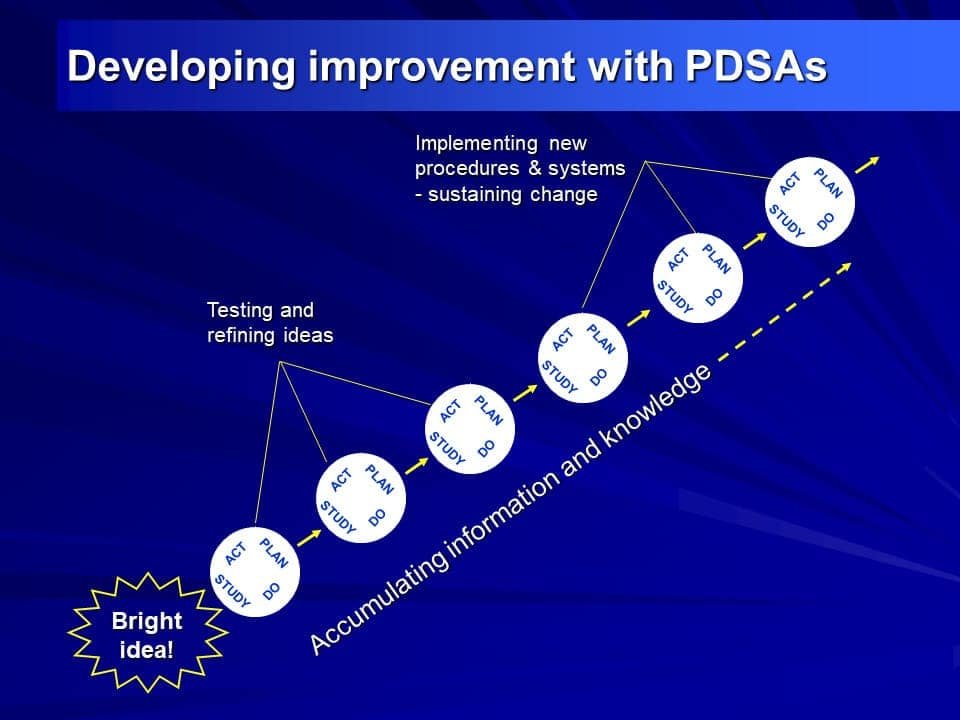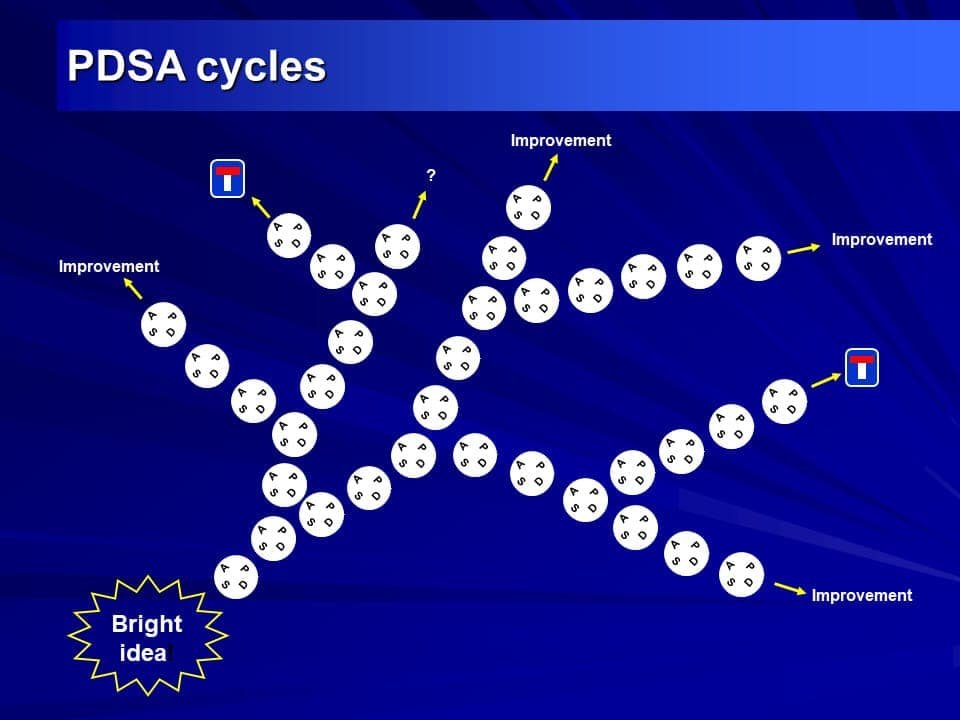Quality Improvement Activity
PDSA cycles
QUICK-LINKS
WEBLINKS
The 3 fundamental questions for Quality Improvement
1. What are we trying to achieve?
Understand the problem. Know what you are trying to achieve. Have clear and desirable aims and objectives
2. How will we know that a change is an improvement?
Measure processes and outcomes
3. What changes can we make that will result in an improvement?
What have others done? What hunches do we have? What can we learn as we go along and how?
Why PDSA?
We need a structured approach to Quality Improvement. Why? Let’s examine what has gone before…
Trial and Error
RESULTS IN CHAOS
Too much action, not enough thinking!
Detailed Studies
RESULTS IN PARALYSIS
Too much thinking & study, not enough action
So – neither of these have helped that much in the past. We need something that does not result in chaos – i.e. is structured, and something which is not too theoretical, and results in action! Welcome to the world of PDSA cycles.
What is a PDSA cycle?
It’s a really simple yet structured way of identifying what will improve quality and of course, implementing them. Look at this example.
- Practice Manager to get list of 10 patients with a bad HBA1C by 24th May
- Receptionists to contact patients to see Dr Sans for review
- Dr Sans to do a Diabetic review and find possible reasons for poor HBA1C (for example: medication concordance, weight, exercise, diet).
Get on and just do it!
- 8 patients turned up, 2 DNA’d. All seemed to be complying with medication.
- However, 7 were overweight
- 6 did not have a good understanding of diabetes and the role of exercise, diet and weight control.
- 6 did not attend a Diabetic Structured Education Programme.
- All 8 did not do much exercise.
- Decided to send a second reminder to these patients and others and invite again to Diabetic Structured Education Programme. See what effect it would have.
- Next cycle: 3 months
- Results: HBA1C still bad. Chased how many went to the Structured Education Programme – only 10% went!

- Receptionists to contact the 8 patients to see Dr Sans for review
- Dr Sans to do a Diabetic to find out why they didn’t go.
Get on and just do it!
- All said they did not attend the Diabetic Education Programme because it was too far away!
- Asked if we had something similar at the surgery (i.e. close by) would they come? They all said yes.
- New education programme developed in-house.
- At the nurse diabetic review appts, patients with a poor HBA1C will be asked to watch educational videos focused on exercise and diet in a separate room set up for them PRIOR to seeing the nurse.
- The nurse will then further that discussion and do a diabetic review.
- Aim – to try to get patients to see that they need to take control – through simple Motivational Interviewing techniques. Review next cycle: 3 months.
- Results: HbA1C better in 60% of patients!!! Result!
Can you see the simplicity of this model?
Of course if you can pick an area where the PDSA has to be completed in no more than 2 weeks – even better! It will make you want to do it.

The GP World of PDSA cycles
Once you get into the hang of doing PDSA cycles, you will see how easy yet powerful they are. And they do not take a lifetime of study to do and implement.
And that’s when you’ll find yourself doing them again and again and again – the world of PDSA cycles – doing another cycle as you spot new things in your clinical practice that you think could do with improving.
They are small in scope BUT they build and improve on quality incrementally!

Summary (PDSAs)
- Improvement requires change to systems
- PDSAs are a tool that help you bring about change in a practical, useful, manageable and managed way
- Starting points: remember the three fundamental questions to guide change
- Remember that you will never know whether the change is better unless you measure
- Keep up the momentum and don’t forget to record what happens

